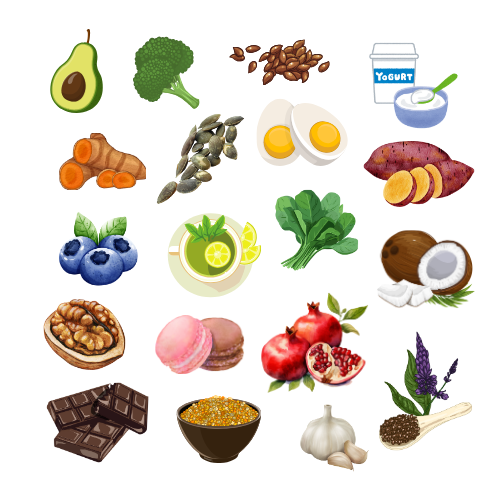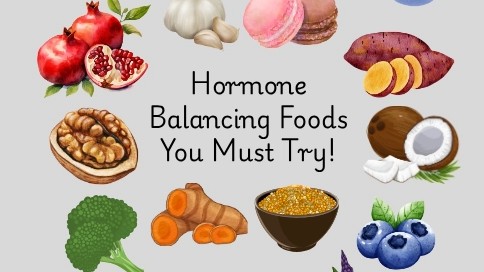Introduction
Hormones are critical chemical messengers that regulate many facets of our health—mood, metabolism, sleep, reproduction, and more. When hormones fall out of balance, it can lead to disruptions such as fatigue, weight gain, mood swings, poor sleep, irregular cycles, or skin changes. While hormonal imbalances have many causes, nutrition plays a key role. In this post, you’ll discover hormone balancing foods—the natural, nutrient‑dense ingredients that help support estrogen, progesterone, cortisol, insulin, and thyroid function, and bring your body back into harmony.
Hormone Balancing Foods: Boost Your Health Naturally
Hormones are chemical messengers that regulate numerous processes in the body, from metabolism and mood to reproductive health and sleep. When hormones are out of balance, it can lead to symptoms like fatigue, weight gain, anxiety, irregular periods, and even chronic illnesses. Fortunately, the food you eat plays a crucial role in supporting hormonal health. By incorporating hormone balancing foods into your diet, you can naturally restore equilibrium and enhance overall well-being.
In this comprehensive guide, we’ll explore the top 20 hormone balancing foods, why they work, and how to include them in your daily meals.
Why Are Hormones Important?
Hormones are powerful chemical messengers that influence nearly every system in the body. Produced by glands such as the thyroid, adrenals, pancreas, and reproductive organs, they travel through the bloodstream to tissues and organs, instructing them on how to function. Even slight imbalances can significantly affect how you feel on a daily basis.
Hormones regulate vital functions such as:
Metabolism: Hormones like insulin, cortisol, thyroid hormones (T3, T4), and growth hormone control how your body uses energy, burns fat, and builds muscle.
Reproductive health: Estrogen, progesterone, testosterone, and luteinizing hormone regulate menstrual cycles, fertility, libido, and sexual health in both men and women.
Sleep patterns: Melatonin, cortisol, and growth hormone work together to regulate sleep-wake cycles, ensuring restorative rest.
Mood regulation: Serotonin, dopamine, and cortisol levels directly influence your mood, stress resilience, and emotional well-being.
Energy levels: Thyroid hormones, cortisol, and insulin determine how efficiently your body converts food into fuel and maintains steady energy throughout the day.
How Can Diet Influence Hormonal Health?
Nutrients from food serve as building blocks for hormone production. For example, healthy fats are essential for synthesizing estrogen and progesterone, while proteins support thyroid hormone production. Including hormone balancing foods in your daily routine can reduce inflammation, stabilize blood sugar, and optimize the endocrine system.
Hormone Balancing Foods:

1. Avocados
Avocados are a powerhouse of healthy monounsaturated fats that play a vital role in supporting adrenal glands and balancing cortisol, the body’s primary stress hormone. Their rich fiber content keeps digestion smooth and helps stabilize blood sugar levels, preventing spikes and crashes that can disrupt hormones. Plus, they’re loaded with potassium and vitamins that nourish your overall endocrine system. Adding avocado to your daily meals, whether on toast or in salads, can naturally boost your hormonal health.
2. Broccoli and Cruciferous Vegetables
Cruciferous vegetables like broccoli, kale, cauliflower, and Brussels sprouts are excellent at helping the body detoxify excess estrogen, which reduces the risk of estrogen dominance and associated issues. They are rich in indole-3-carbinol, a compound that supports liver detoxification and hormone metabolism. Consuming these veggies regularly also provides plenty of antioxidants and fiber for overall wellness. Steam, stir-fry, or enjoy them raw to maximize their benefits.
3. Salmon
Salmon is packed with omega-3 fatty acids, which are essential for reducing inflammation and supporting brain, thyroid, and heart health. These healthy fats also improve cell membrane function, which is crucial for proper hormone signaling throughout the body. Additionally, salmon is an excellent source of protein and vitamin D, both important for hormone regulation. Opt for wild-caught salmon for the highest nutrient content.
4. Flaxseeds
Flaxseeds are tiny seeds with massive benefits, particularly when it comes to estrogen metabolism. They are rich in lignans, plant compounds that help balance estrogen levels and support reproductive health. Additionally, their high fiber content aids digestion and keeps your blood sugar steady. Sprinkle ground flaxseeds into smoothies, yogurt, or oatmeal for an easy daily boost.
5. Greek Yogurt
Greek yogurt is not only a delicious snack but also a probiotic-rich food that supports a healthy gut microbiome. Since gut health is directly linked to hormonal balance, maintaining a good balance of gut bacteria can positively influence hormone regulation. It’s also packed with protein and calcium, which support bone and muscle health. Choose plain, unsweetened Greek yogurt and top it with fresh fruits or nuts for extra benefits.
6. Turmeric
Turmeric, known for its bright golden color, is a powerful anti-inflammatory spice that helps reduce chronic inflammation, a major disruptor of hormones. It also supports liver detoxification, which is essential for processing and balancing hormones effectively. The active compound curcumin enhances overall cellular health. Try adding turmeric to curries, teas, or even golden milk to enjoy its healing properties.
7. Eggs
Eggs are nature’s multivitamin, providing protein, healthy fats, and key nutrients like choline and vitamin D—all essential for hormone synthesis. The healthy cholesterol in egg yolks acts as a building block for many hormones, including estrogen, testosterone, and progesterone. They also keep you full and satisfied, reducing cravings and blood sugar fluctuations. Including whole eggs in your diet can help maintain hormonal equilibrium naturally.
8. Pumpkin Seeds
Pumpkin seeds are a rich source of zinc, an essential mineral that supports testosterone production in men and progesterone in women. This makes them particularly beneficial for reproductive health and fertility. They also contain magnesium, iron, and healthy fats that further support hormonal function. Snack on roasted pumpkin seeds or add them to salads and smoothies to enhance your nutrient intake.
9. Spinach
Spinach is loaded with magnesium, a mineral known for calming the nervous system and reducing stress hormones like cortisol. When stress is managed, hormonal balance becomes easier to maintain. Spinach also provides iron, folate, and antioxidants that promote overall cellular health. Adding it to your salads, smoothies, or sautéed dishes is an effortless way to improve hormonal wellness.
10. Blueberries
Blueberries are tiny but mighty, loaded with antioxidants that combat oxidative stress, a major factor that can disrupt hormones. They also improve insulin sensitivity, helping regulate blood sugar levels—a key aspect of hormone balance. These berries are naturally sweet, low in calories, and high in fiber, making them a perfect snack. Add them to your breakfast bowl or enjoy them as a refreshing treat.
11. Sweet Potatoes
Sweet potatoes are rich in complex carbohydrates that release energy slowly, preventing sudden spikes in blood sugar levels. They also contain vitamin B6, which supports progesterone production and helps reduce PMS symptoms. Additionally, their beta-carotene content boosts skin and eye health. Including sweet potatoes in your meals not only supports hormones but also keeps you full and energized.
12. Coconut Oil
Coconut oil is a healthy fat that supports thyroid function, an important gland responsible for regulating metabolism and energy. Its medium-chain triglycerides (MCTs) are quickly absorbed and used as energy, reducing stress on the body. Coconut oil also aids in hormone production by providing necessary fat building blocks. Use it in cooking or as a replacement for less healthy oils.
13. Green Tea
Green tea is packed with antioxidants like catechins, which help lower stress hormones and support metabolism. Regular consumption can improve insulin sensitivity, aiding in blood sugar control and hormonal stability. It’s also a natural energy booster without the jitteriness of coffee. Sipping a cup daily can be a calming and health-promoting ritual.
14. Walnuts
Walnuts are an excellent plant-based source of omega-3 fatty acids, which support hormonal balance by reducing inflammation and improving brain function. They also help balance estrogen and progesterone levels, promoting reproductive health. In addition, walnuts provide protein, fiber, and minerals that support overall wellness. A handful of walnuts makes a nutritious snack or salad topping.
15. Pomegranates
Pomegranates are rich in antioxidants and compounds that help regulate estrogen levels, making them a great food for hormonal health. They also improve heart health and reduce inflammation in the body. Regular consumption of pomegranate or its juice can enhance reproductive and skin health. Enjoy them fresh or add the seeds to salads, smoothies, or yogurt bowls.
16. Chia Seeds
Chia seeds are tiny nutritional powerhouses packed with omega-3 fatty acids and fiber, which support hormone regulation and improve insulin sensitivity. They also provide protein and antioxidants, making them an excellent addition to a balanced diet. These seeds absorb liquid and form a gel-like consistency, which is great for digestion. Add them to puddings, smoothies, or even baked goods.
17. Maca Root
Maca root is an adaptogen known for its ability to support adrenal health and improve fertility. It helps the body adapt to stress and balance hormones naturally, particularly in women experiencing PMS or menopause symptoms. This root also enhances energy and mood. You can find it in powder form and mix it into smoothies or teas for a daily boost.
18. Garlic
Garlic is more than just a flavor enhancer—it supports liver function, which is essential for detoxifying hormones. It also reduces inflammation, helping your body maintain a balanced hormonal state. Rich in sulfur compounds, garlic promotes overall immune health too. Incorporate it into your meals regularly to enjoy its multiple benefits.
19. Dark Chocolate
Dark chocolate is a delicious way to support your hormones, as it’s rich in magnesium and antioxidants that reduce stress and improve mood. The magnesium content also helps regulate cortisol and promotes relaxation. Choose chocolate with at least 70% cacao to maximize its health benefits. Enjoy a small piece as an indulgent yet healthful treat.
20. Lentils
Lentils are high in plant-based protein and fiber, which help stabilize blood sugar levels—a critical factor for hormonal balance. They also contain iron and B vitamins, which support energy metabolism and reproductive health. Lentils are incredibly versatile, fitting easily into soups, salads, and curries. Regular consumption can support steady energy and overall hormonal health.
Tips to Include Hormone Balancing Foods in Your Diet
Eating for hormonal health doesn’t have to be complicated. Small, intentional changes to your daily meals can have a big impact on how your body feels and functions. Here are practical tips to help you naturally integrate hormone-balancing foods into your routine:
Start your day with a protein-rich breakfast
Include eggs, Greek yogurt, or a protein smoothie with nut butter to stabilize blood sugar and reduce cortisol spikes early in the day. Avoid skipping breakfast, as it can lead to energy crashes and hormonal stress later.
Add seeds like flax, chia, or pumpkin to your meals
These seeds are rich in omega‑3s, fiber, and micronutrients like magnesium and zinc that support reproductive and adrenal hormones. Sprinkle them on oatmeal, salads, or blend them into smoothies for an easy boost.
Incorporate healthy fats into your meals
Avocados, olive oil, coconut oil, nuts, and fatty fish provide essential fatty acids needed for hormone synthesis. Include at least one source of healthy fat in each meal to promote balanced estrogen and progesterone levels.
Include a variety of colorful vegetables daily
Cruciferous vegetables like broccoli, kale, and cabbage support liver detoxification, which is vital for estrogen balance. Aim to fill half your plate with colorful vegetables at lunch and dinner to maximize phytonutrient intake.
Reduce processed foods and refined sugars
Processed foods spike insulin and contribute to inflammation, both of which disrupt hormone signaling. Replace sugary snacks with fruit, nuts, or yogurt, and choose whole foods over packaged items whenever possible.
Lifestyle Changes for Hormonal Health
While diet is crucial, combining it with healthy habits can further enhance hormonal balance:
Get quality sleep to regulate cortisol and melatonin.
Manage stress through yoga, meditation, or deep breathing.
Exercise regularly to improve insulin sensitivity and reduce stress.
Avoid endocrine disruptors found in plastics and chemical products.
Conclusion
Balancing your hormones naturally is achievable by choosing the right foods and supporting your body with healthy lifestyle habits. From avocados to lentils, these hormone balancing foods provide essential nutrients that help your endocrine system thrive. Start integrating them into your daily meals to experience improved energy, mood, and overall health.
FAQs
1. What are the best foods to balance hormones naturally?
Foods rich in healthy fats, proteins, and antioxidants—such as avocados, salmon, flaxseeds, chia seeds, walnuts, and cruciferous vegetables—are excellent for balancing hormones. These foods supply essential nutrients like omega‑3 fatty acids, magnesium, zinc, and B‑vitamins that support hormone production and regulation. Adding a variety of colorful vegetables, fermented foods for gut health, and hormone-friendly spices like turmeric can further enhance balance.
2. Can diet alone fix hormonal imbalance?
While diet plays a significant role, combining it with stress management, regular exercise, quality sleep, and minimizing toxin exposure ensures better hormonal balance. Food acts as the foundation for hormonal health, but lifestyle factors such as managing cortisol through relaxation techniques and staying active are equally important for long-term results.
3. How quickly can foods affect hormone levels?
Positive changes can be observed within a few weeks of consistently eating hormone-friendly foods. Some people notice improved energy, better moods, and reduced cravings in as little as 2–4 weeks. However, deeper hormonal regulation—such as cycle regularity, thyroid function improvement, or weight stabilization—may take 6 to 12 weeks or longer, depending on individual health conditions and consistency.
4. Are there foods that worsen hormonal imbalance?
Yes, processed foods, refined sugars, trans fats, and excessive caffeine can disrupt hormonal health. These foods cause inflammation, spike insulin, and increase stress hormones like cortisol. Additionally, high consumption of alcohol and artificial sweeteners may negatively influence reproductive and metabolic hormones. Limiting these foods and focusing on whole, nutrient-dense options is key.
5. Is it safe to use supplements for hormone balance?
While some supplements, such as magnesium, vitamin D, and omega‑3s, may help support hormonal health, it’s best to focus on whole foods first. Supplements should only be used when deficiencies are confirmed or when recommended by a healthcare professional. Self-medicating with hormones or high-dose supplements without guidance can lead to imbalances and side effects.
By including these hormone balancing foods in your daily routine, you can naturally support your endocrine system, improve your overall health, and maintain a vibrant lifestyle.






No comments yet. Be the first to comment!